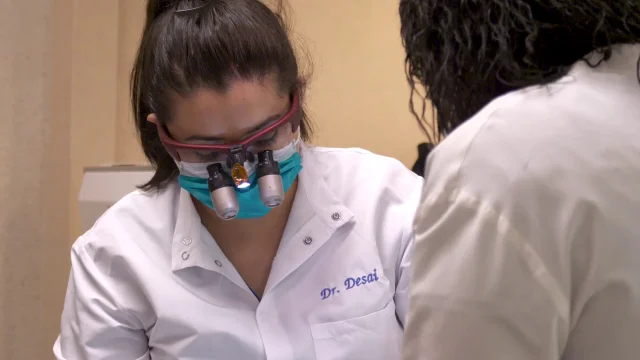By: General Dentist Ekta Desai
People who claim to have soft teeth are likely to go to the dentist more frequently due to tooth sensitivity, cavities, toothaches, and other issues no matter how diligent their oral health care is. Some individuals say that after having children, as they age, or go through other life changes they notice a decline in their oral health—even if their habits haven’t changed and they’ve had great dental health previously.
The truth is, there’s no such thing as “soft teeth.” Many people who think they have "soft teeth" actually have teeth that are less likely to withstand everyday wear and tear even with the best daily hygiene. Luckily, there are measures you can take to protect your teeth and make them less cavity-prone and able to withstand everyday use.
Causes of Soft Teeth
Heartburn or acid reflux can make your teeth more susceptible to cavities caused from damaged enamel. When stomach acid flows from your stomach into your esophagus and mouth, your teeth are exposed to erosion-causing acid. The damage caused by stomach acid is worse than that of sugar, soda, and other harmful substances that can cause cavities.
Here are other potential factors that can contribute to weakened enamel and the perception of soft teeth:
- Hormonal imbalances
- Fever
- Malnutrition
- Vitamin deficiencies
- Trauma
- Dental decay
- Bacteria
- Infections in baby teeth
It’s important to not confuse poor oral health with the misconception of having soft teeth.
Do I Have Soft Teeth?
You may be wondering if you have soft teeth, or if you’re getting cavities now because you’ve developed soft teeth over time.
The answer is probably not, and here are several reasons why:
For a tooth to be soft or weaker, you need to have experienced an event that would damage your teeth while they were developing. Except for wisdom teeth, the development of teeth ends around age 14. Therefore, unless your baby teeth had excessive bacteria or infections, you were very ill, or had a hormone imbalance or malnutrition, it’s unlikely that your teeth are soft.
However, this doesn’t mean that teeth may not become weaker as a result of sugar exposure, acid reflux, or irregular oral health care, but rather that your teeth likely did not develop to be soft or have weak or thinning enamel.
Second, in nearly all cases, your teeth will look different if they are weak. Teeth may have brown spots, chalky spots, banding, or other unusual appearances. If your teeth look normal, and your dentist has never mentioned any unusual findings, your teeth are most likely not “soft.”
Misconceptions About Soft Teeth
Many people incorrectly believe that certain events can cause their teeth to become soft. These include pregnancy, breastfeeding, a diagnosis of diabetes as an adult, new allergies, and others.
If you’re developing cavities, they’re most likely from a poor diet and/or poor oral hygiene. Developing soft teeth is not something that occurs later in life. Rather, it happens in the developmental stages of teeth. Major life changes or traumas may contribute to a change in your oral health, but it is unlikely to cause “soft teeth.”
How to Prevent Cavities and Keep Your Teeth Strong
- Learn how to establish a good oral health routine and incorporate it into your schedule. Brush at least two times per day and floss at least once.
- Make sure you know how to brush your teeth. Not using enough force or using too much force can be detrimental to your oral health. Consider investing in an electric toothbrush to make it easier to thoroughly clean without causing damage to your teeth and gums.
- Also, make sure you know how to floss properly. Many people avoid flossing because they aren’t sure how to do it properly. If you don’t know, ask your dental hygienist for a tutorial during your next visit.
- Choose foods that are good for your teeth. Limit foods that are high in sugars and starch.
- Switch out sugary sodas and juices for more water. Water helps wash away food particles and bacteria.
- Keep up with regular dental exams.
- Don’t allow your child to fall asleep with a bottle of milk or juice, as this can cause baby bottle tooth decay. Also, discourage thumb sucking as much as possible.
- Schedule your child’s first dental visit when their first tooth erupts or by their first birthday—whichever comes first.
- Help your child understand the importance of good oral hygiene by including brushing and flossing as part of their morning and evening routines.
If you’re experiencing tooth pain or sensitivity, work with your doctor to determine a care plan that will help prevent cavities and protect your teeth. Schedule an appointment with one of our dental teams today…we’re happy to help!
Meet Dr. Ekta Desai
Dr. Desai is a general dentist at Dental Associates Wauwatosa. Get to know her by visiting her profile page: General Dentist Ekta Desai



